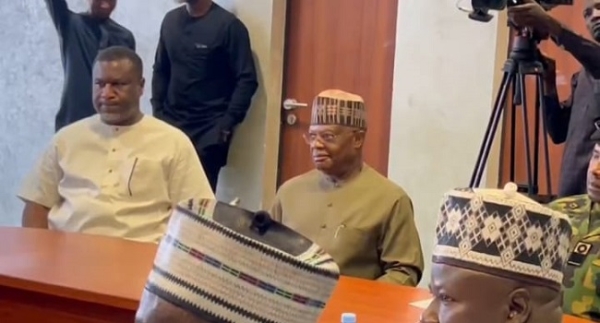The Sole Administrator of Rivers State, Vice Admiral Ibok-Ete Ibas (Rtd), has said that although the state is relatively calm, it remains fragile.
He indicates the peace being experienced is still delicate and requires careful handling in the face of a continuing political transition.
Speaking during a meeting with the House of Representatives Ad-hoc Committee on Rivers State Oversight on Friday, Ibas acknowledged the critical role the committee plays in preserving the democratic and constitutional integrity and assured members of his willingness to fully cooperate in their ongoing assignment.
He expressed regret over his inability to attend earlier engagements with the committee.
“Today is exactly ten days after the first invitation, and in between we’ve had four days that were off calendar as public holidays, plus the weekends inclusive,” he said.
He clarified that his absence was not intended as a slight on the committee but due to the pressing and urgent demands of stabilising governance in a deeply troubled environment.
“The absence, of course, was not out of disregard, but rather due to the weighty and urgent demands of stabilizing governance in a state under a declared emergency,” Ibas explained.
He reiterated his regard for the committee’s efforts to ensure accountability and effective oversight during the ongoing transition in the state.
“I have always held the National Assembly in the highest regard. I recognize the importance of your oversight responsibilities and your interest in the progress being made in Rivers State,” he stated.
However, despite the return of a degree of order, Ibas emphasised that the state remains in a fragile condition, pointing to the need for careful and measured interventions.
“Rivers State is presently relatively calm, but still fragile,” he warned.
The Sole Administrator appealed to the committee for more time to properly gather and prepare a comprehensive report on the state’s affairs.
“I only request your understanding and the indulgence of this committee to grant me additional time to adequately prepare and present a comprehensive and constructive briefing,” he said.
He stressed that the complexities and sensitivities surrounding the transitional period in Rivers made it necessary to approach every detail with caution and thoroughness.
“Given the complexities and sensitivities surrounding the current transitional period in Rivers State, it is important that any engagement with this committee is done with the depth, accuracy and clarity it rightfully deserves,” he explained.
Ibas assured the committee of his full cooperation moving forward, and promised to ensure that all relevant information would be made available in due course to aid the committee’s work.
“I remain fully committed to cooperating with the committee and to ensuring that all relevant information is made available in due course to support your important work,” he said.
He concluded his remarks by thanking the chairman and members of the committee for their patience and dedication to national service, while also appreciating members of the press for their ongoing role in supporting the federal government’s efforts in Rivers State.
The Chairman of the House of Representatives Ad-hoc Committee on Rivers State Oversight, Prof Julius Ihonvbere, underscored the constitutional role of the National Assembly in legitimising and overseeing the state of emergency declared in Rivers State.
He stressed that the federal legislature remains central to the state’s transitional process.
Ihonvbere reaffirmed the committee’s constitutional mandate and expressed satisfaction that the administrator had finally honoured the invitation after earlier delays.
He emphasised that the committee’s mandate was rooted in constitutional authority and that some of its terms had already been communicated to the administrator in an earlier letter.
Citing relevant sections of the 1999 Constitution as amended, Ihonvbere reminded the administrator that the power to declare a state of emergency under Section 305 rests with the President but that the National Assembly must approve it before it becomes effective.
“For that state of emergency, the gazette must be sent to the National Assembly for approval. It’s only that approval that gives life to the state of emergency. I repeat that so that you know how critical the National Assembly is to that process,” he said.
He further referenced Section 11(4) of the Constitution, which empowers the National Assembly to take over the legislative functions of a state assembly when it is unable to function.
“That also means that all functions of the state House of Assembly, including budget approval, must come to the National Assembly and, by implication, this very committee,” he explained.
Ihonvbere clarified the committee’s efforts to engage with the administrator from the onset of the crisis.
He noted that despite multiple attempts, including written correspondence, there were delays in securing the administrator’s appearance.
The chairman encouraged the administrator to feel at ease, stressing that the committee members had been carefully selected to ensure broad representation across geopolitical zones and legislative experience.
After the meeting, Ihonvbere said a new date for a meeting would be announced.
He said a statement on the update on the situation would be released by the House Spokesman.


